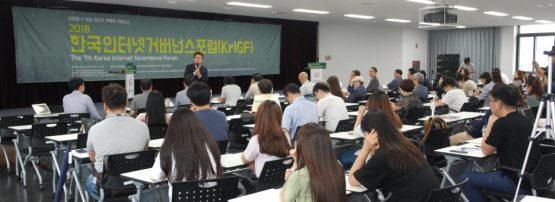
This is the third in our KRSeries ahead of APRICOT 2019 in Daejeon, South Korea.
“Communication leads to community — that is, to understanding, intimacy and mutual valuing,” Rollo May.
National Internet Registries (NIRs) play an important role in the APNIC region. Being situated within an economy and employing local staff — some of whom have experience in the industry and, most importantly, are able to speak the language — can help with understanding a local community’s challenges.
The Korea Network Information Center (krNIC) is one of seven NIRs in the Asia Pacific. Established as a community initiative in 1999, it has played a leading role in allocating and assigning IP addresses and ASNs within South Korea as well as providing domain registration services for the .kr country code top-level domain, and ensuring the operation, evolution and security of the DNS.
However, its recent efforts to listen to and assist with overcoming its community’s challenges, in particular cybersecurity, is what has garnered most interest from the local community.
Greater priority has been placed on ensuring the cyber and physical security of Internet address resources and .kr domain registrars, through regular engagements and training courses with members. These include free basic and advanced courses for DNS server administrators, which include how to set up and operate DNSSEC features and, more recently, what operators needed to know about ICANN’s KSK Rollover. krNIC also relocated several ISPs’ DNS servers and deployed specialized lines to these, which now provide DDoS protection service at the backbone infrastructure level.
Director, Jinhyun Cho, associates much of this change in the registry’s function to community feedback as well as krNIC’s close relationship with the Korea Internet Security Agency (KISA).
“Since coming under supervision of KISA in 2009, krNIC has benefited from exchanging staff between other security departments, myself included,” explains Jinhyun, who prior to becoming Director was a senior researcher at KISA; during which time he was involved with many intergovernmental and CERT/CSIRT activities, including serving as deputy chair of Asia Pacific Computer Emergency Response Team (APCERT).
“Because there are so many privacy protection and cybersecurity experts within KISA, we can get prompt advice on best current practices and what threats to look out for, which we can relay to our members.
“At the same time, we are educating others in KISA, and in the wider cybersecurity community, about how the DNS operates and how the Internet address ecosystem works,” systems often presumed known but rarely fully comprehended by security professionals. “So, there is greater awareness and cohesion among the whole cyber community, which strengthens our collective effort to mitigate cyber threats.”
Developing the next generation of Internet leaders
Another priority that krNIC has focused on in the last three years has been supporting the development of next-generation Internet leaders through the Asia Pacific Internet Governance Academy (APIGA).
“This is in response to decreasing involvement from our community in local Internet governance and policy forums in the past few years,” says Jinhyun.
Established in 2016, the APIGA is a five-day capacity development workshop focused on improving participants’ — undergraduate and post-graduate students in South Korea and the Asia Pacific — understanding of the fundamentals of Internet infrastructure, as well as of the history and status of Internet governance issues, and the multistakeholder processes that are largely responsible for driving these issues.
“The APIGA provided a perfect platform for us to not only generate activity and discussion in this area but also to share our role and responsibility with the broader community of students who have an interest in Internet governance but not necessarily any formal or technical understanding of Internet protocols, infrastructure or domain services.”
Ultimately, it’s about preparing the next generation of Internet leaders by helping them connect with and understand the various facets and actors associated with what is a complex yet intimate community.
The views expressed by the authors of this blog are their own and do not necessarily reflect the views of APNIC. Please note a Code of Conduct applies to this blog.
